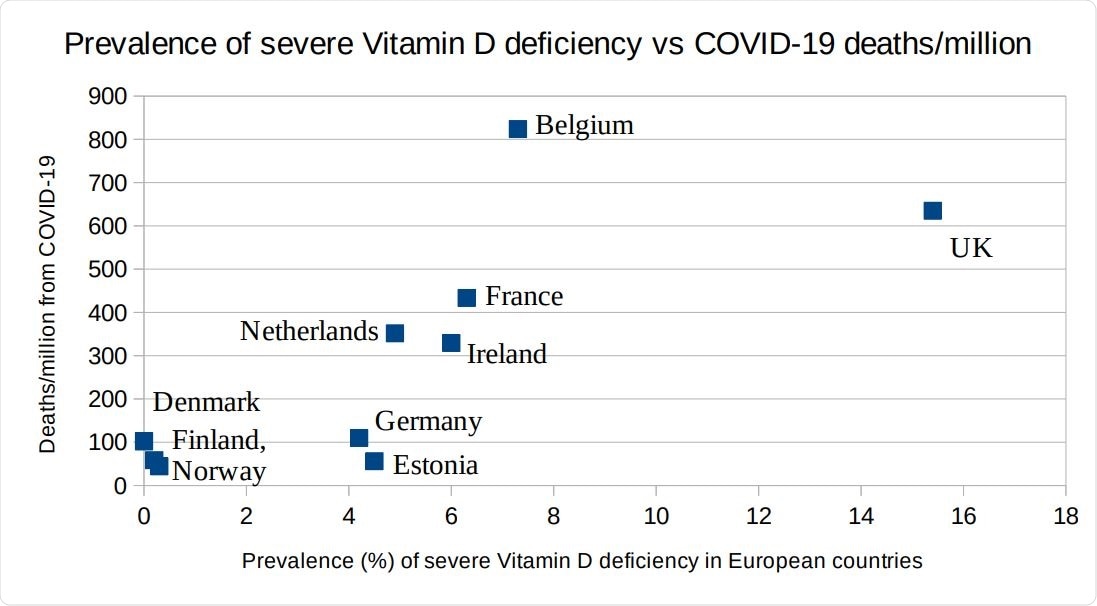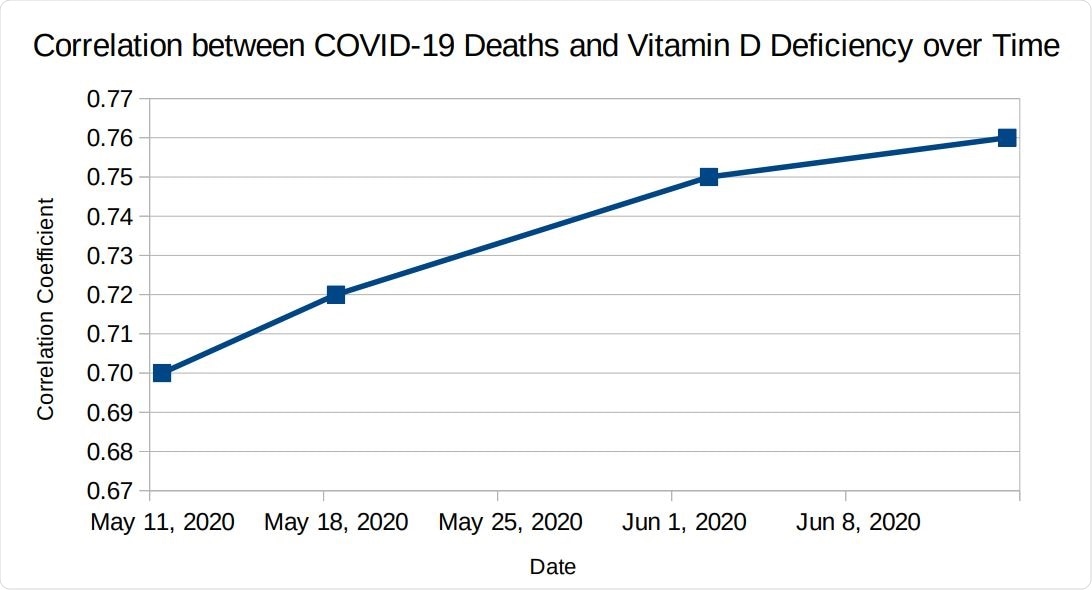Physicians at the Complete Med Care clinic in Dallas, Texas, have conducted a study showing that the prevalence of severe vitamin D deficiency is strongly correlated with coronavirus disease 2019 (COVID-19) mortality rate in European countries.
The researchers say the correlation also strengthened over time, making it even less likely to be a random effect.
Dr. Isaac Pugach and Dr. Sofya Pugach recommend that physicians perform universal screening for Vitamin D deficiency.
They also say vitamin D supplementation should be tested in randomized controlled trials as a potential new treatment or preventative approach to COVID-19.
A pre-print version of the paper is available in the server medRxiv*, while the article undergoes peer review.
.jpg)
Novel Coronavirus SARS-CoV-2 Colorized scanning electron micrograph of an apoptotic cell (red) infected with SARS-COV-2 virus particles (yellow), isolated from a patient sample. Image captured at the NIAID Integrated Research Facility (IRF) in Fort Detrick, Maryland. Credit: NIAID

 This news article was a review of a preliminary scientific report that had not undergone peer-review at the time of publication. Since its initial publication, the scientific report has now been peer reviewed and accepted for publication in a Scientific Journal. Links to the preliminary and peer-reviewed reports are available in the Sources section at the bottom of this article. View Sources
This news article was a review of a preliminary scientific report that had not undergone peer-review at the time of publication. Since its initial publication, the scientific report has now been peer reviewed and accepted for publication in a Scientific Journal. Links to the preliminary and peer-reviewed reports are available in the Sources section at the bottom of this article. View Sources
Assessing Vitamin D and COVID-19 population data
The severity of disease in cases of COVID-19 ranges significantly, from asymptomatic to fatal, and the reasons for this are often unclear.
The researchers say that since some evidence suggests that vitamin D may play a protective role, they decided to assess European country-wide data to establish whether there is any link between levels of vitamin D and COVID-19 mortality rate.
The team assessed vitamin D population data that had been compiled by the European Credit Transfer and Accumulation System (ECTS) Statement on Vitamin D Status and published in the European Journal of Endocrinology.
Data was only used if it had been published within the last ten years and included information on the general adult population for both males and females aged between at least 40 and 65 years. Data also needed to include breakdowns for the prevalence of vitamin D deficiency, rather than mean values.
The number of deaths due to COVID-19 was ascertained using data from the John Hopkins University of Medicine Coronavirus Resource Center. Data on 2020 demographics were determined using country data from the CIA World Factbook.
The researchers retrieved the data between May 11th and June 14th, 2020, and then performed a Pearson correlation analysis. Regression analysis was also conducted to ensure the age structure of each country’s population was adjusted for.

Prevalence of Severe Vitamin D deficiency vs. COVID-19 Deaths per Million in Europe
Severe vitamin D deficiency strongly correlated with COVID-19 mortality rate
Overall, ten countries met data inclusion criteria, namely the UK, Ireland, France, Germany, Belgium, the Netherlands, Denmark, Finland, Norway, and Estonia.
The researchers report that the prevalence of severe vitamin D deficiency (defined as 25(OH)D less than 25 nmol/L) strongly and significantly correlated with the COVID-19 death rate per million people.
The correlation coefficient of 0.76 indicates that approximately 58% of COVID-19 mortality can be explained by severe deficiency in vitamin D, says the team.
After adjustment for the population age structure of each country, the correlation remained strong and significant.
“Moreover, over time, the correlation is increasing asymptotically, making this correlation even less likely to be caused by a random chance,” writes the team.

Correlation between COVID-19 Deaths and Vitamin D Deficiency over Time
Previous studies support the finding
According to the authors, the results are supported by other studies demonstrating potential associations between low vitamin D and the severity of COVID-19.
In the United States, for example, the COVID-19 mortality rate among blacks and Hispanic Americans is higher than among the general population, and it is well established that these groups have lower levels of vitamin D, compared with other groups.
The researchers say the study findings do not necessarily mean low levels of vitamin D increase the COVID-19 mortality rate or that normalizing the vitamin D level would bring this rate down.
Other variables could account for both a higher prevalence of vitamin deficiency and a higher COVID-19 mortality rate, such as unknown genetic factors or inadequate healthcare services, they write.
However, studies have indicated that vitamin D deficiency is linked to an increased risk for and severity of various infections, writes the team, and one randomized controlled trial supported the use of supplementation to prevent influenza among school children.
Furthermore, studies have also provided evidence supporting the use of vitamin D supplementation to prevent COVID-19 infection, say the researchers.
What do the authors advise?
Taken together, “it is very likely that vitamin D supplements have a large role in prevention and possibly treatment of COVID-19 disease,” they write.
In conclusion, the authors say they “recommend universal screening for vitamin D deficiency, and further investigation of Vitamin D supplementation in randomized control studies, which may lead to possible treatment or prevention of COVID19.”

 This news article was a review of a preliminary scientific report that had not undergone peer-review at the time of publication. Since its initial publication, the scientific report has now been peer reviewed and accepted for publication in a Scientific Journal. Links to the preliminary and peer-reviewed reports are available in the Sources section at the bottom of this article. View Sources
This news article was a review of a preliminary scientific report that had not undergone peer-review at the time of publication. Since its initial publication, the scientific report has now been peer reviewed and accepted for publication in a Scientific Journal. Links to the preliminary and peer-reviewed reports are available in the Sources section at the bottom of this article. View Sources